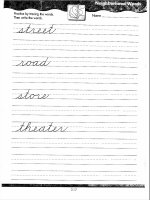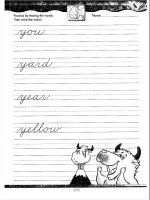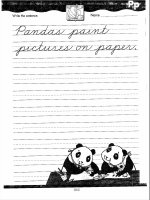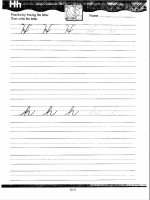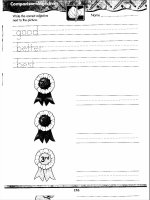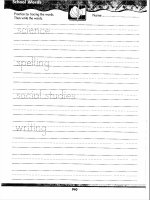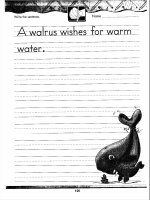The routledge book of world proverbs
Bạn đang xem bản rút gọn của tài liệu. Xem và tải ngay bản đầy đủ của tài liệu tại đây (2.01 MB, 545 trang )
THE ROUTLEDGE BOOK OF
WORLD PROVERBS
A good book, a good friend. (Italian)
Neither love nor a cough can be hidden. (Roman)
Knowledge is a treasure, but practice is the key to it. (Arabian)
One enemy is too many, one hundred friends is not enough. (Indian)
The Routledge Book of World Proverbs invites the reader to travel the globe in search of the
origins of such words of wisdom, experiencing the rich cultural traditions reflected in
each nation’s proverbs. This collection contains over 16,000 gems of humor and pathos
that draw upon themes from our shared experiences of life. And we are not just invited
to learn about other cultures; proverbs are ‘bits of ancient wisdom’ and thus teach us
about our shared histories.
This book draws together proverbs that transcend culture, time and space to offer a
collection that is both useful and enjoyable, making this book one of enduring interest.
Professor Jon R. Stone specializes in Theories and Methods in the Study of Religion.
He is author or editor of nine books, including The Essential Max Müller (2002),
Expecting Armageddon: Essential Readings in Failed Prophecy (Routledge, 2000), The Craft of
Religious Studies (1998), and Latin for the Illiterati (Routledge, 1996), which was named
‘1997 Outstanding Reference Source’ by the American Library Association.
visit />for more eBooks and downloads
THE ROUTLEDGE BOOK OF
WORLD PROVERBS
Jon R. Stone
First published 2006 in the USA and Canada
by Routledge
270 Madison Avenue, New York, NY 10016
Simultaneously published in the UK
by Routledge
2 Park Square, Milton Park, Abingdon, Oxon OX14 4RN
Routledge is an imprint of the Taylor & Francis Group, an informa business
© 2006 Jon R. Stone
This edition published in the Taylor & Francis e-Library, 2006.
“To purchase your own copy of this or any of Taylor & Francis or Routledge’s
collection of thousands of eBooks please go to www.eBookstore.tandf.co.uk.”
All rights reserved. No part of this book may be reprinted or reproduced or utilized in any
form or by any electronic, mechanical, or other means, now known or hereafter invented,
including photocopying and recording, or in any information storage or retrieval system,
without permission in writing from the publishers.
Library of Congress Cataloging in Publication Data
Stone, Jon R., 1959–
The Routledge book of world proverbs / Jon R. Stone.
p. cm.
Includes bibliographical references and index.
1. Proverbs. I. Title.
PN6405.S85 2006
398.9—dc22
2006008640
British Library Cataloguing in Publication Data
A catalogue record for this book is available from the British Library
ISBN10: 0–415–97423–2 (hbk)
ISBN10: 0–415–97424–0 (pbk)
ISBN10: 0–203–96895–6 (ebk)
ISBN13: 978–0–415–97423–3 (hbk)
ISBN13: 978–0–415–97424–0 (pbk)
ISBN13: 978–0–203–96895–6 (ebk)
Also available from Routledge
Language: the Basics (Second edition)
R.L. Trask
0–415–34019–5
Semiotics: the Basics (Second edition)
Daniel Chandler
0–415–36375–6
Psycholinguistics: the Key Concepts
John Field
0–415–25891–X
Key Concepts in Language and Linguistics
R.L. Trask
0–415–15742–0
The Routledge Companion to Semiotics and Linguistics
Paul Cobley
0–415–24314–9
The Routledge Dictionary of English Language Studies
Michael Pearce
0–415–35172–3
The Routledge Dictionary of Egyptian Gods and Goddesses
George Hart
0–415–34495–6
The Routledge Dictionary of Gods, Goddesses, Devils and Demons
Manfred Lurker
0–415–34018–7
British Folk Tales and Legends
Katharine Briggs
0–415–28602–6
Also by Jon R. Stone
Latin for the Illiterati (1996)
More Latin for the Illiterati (1999)
The Routledge Dictionary of Latin Quotations (2005)
and
The Craft of Religious Studies (1998)
The Essential Max Müller: On Language, Mythology, and Religion (2002)
Expecting Armageddon: Essential Readings in Failed Prophecy (2000)
A Guide to the End of the World (1993)
On the Boundaries of American Evangelicalism (1997)
Prime-Time Religion: An Encyclopedia of Religious Broadcasting (1997)
In honor of Dr William P. Germano
The dean of academic editors –
with deepest appreciation
CONTENTS
Preface
References and Sources
World Proverbs
Subject Index
xi
xvii
1
495
P R E FAC E
‘Wisdom is learned through the wisdom of others.’ – Yoruban
In his small book of Persian proverbs, Lawrence Elwell-Sutton relates the
fable of a sparrow into whose nest the wind chances to blow a cotton seed.
Not knowing what it was, the sparrow inquired of his neighbor and learned
that, at length, the seed, if planted, would grow to produce cotton, which
could be spun into thread, which could be woven into cloth, which could
be dyed and sewn into fine coats, which then could be sold at the bazaar.
Delighted by the prospect of gain, the sparrow thereupon took the seed to a
peasant farmer, saying, ‘Sow this seed! Half for me, half for you.’ The farmer
agreed. After a time, the seed produced a plant whose ripened cotton bolls
the farmer divided with the sparrow. Next, the sparrow took his share of
cotton to the spinner, saying, ‘Spin this cotton! Half for me, half for you.’
The spinner agreed, and when the thread was spun, he divided it with the
sparrow. The sparrow then took the thread to the weaver, saying, ‘Weave this
thread! Half for me, half for you.’ The weaver agreed and gave the sparrow
half of what he had woven. Next, the sparrow took the cloth to the dyer,
saying: ‘Dye this cloth! Half for me, half for you.’ The dyer agreed and dyed
the cloth a brilliant blue. But when the sparrow saw the cloth drying on the
line, he marveled at the color and thought to himself, ‘What a pity to divide
such a fine piece of cloth.’ So, the sparrow swooped down, snatched the
cloth, and took it to the tailor, saying, ‘Sew this cloth into coats! One for me,
one for you.’ The tailor made two fine coats and hung them on a peg. But,
seeing the coats, the sparrow marveled at the stitching and thought to
himself. ‘What a pity to share them with the tailor.’ So, the sparrow swooped
down, snatched the coats, and took them to the mullah to keep until the
weather grew cold and they could be sold at the bazaar. But after the
sparrow had flown away, the mullah thought to himself, ‘What need has a
xi
PREFACE
sparrow for a coat,’ and decided to keep them for himself. When winter
approached, the sparrow came for his coats, but the mullah pretended to
know nothing and offered instead to pray for the sparrow. Angry at being
cheated, the sparrow flew off, but from a distance he saw the mullah washing
the two coats and hanging them up to dry. When the mullah had gone off
to pray, the sparrow swooped down, snatched both coats, and took them to
the bazaar to sell. But on the way, a great wind blew and carried the two
coats away, dropping one coat before the dyer and the other coat before the
tailor. In this way justice was done. Hence the proverb, ‘What is brought by
the wind will be carried away by the wind’ (see Elwell-Sutton 1954: 33–4).
This fable, reminiscent of those told by Aesop, offers an apt example of
how a simple tale can teach a profound lesson. Not only is justice served,
even to double-dealing sparrows and mullahs, but one learns that the wind,
in bestowing her gifts, can be just as capricious as a bird. Indeed, one can
almost hear the sparrow’s neighbor – perchance having witnessed the whole
affair from afar – sigh and then recite quietly to himself this very proverb,
‘What is brought by the wind . . .,’ his voice trailing off into a faint laugh. In
this instance, ‘recite’ is perhaps the best word to use. For just as this sparrow’s
misadventure brought to mind the proverb cited above, who among us has
not greeted the day by glancing out the window while reciting the line,
‘Red sky in the morning, sailor take warning . . .,’ or greeted someone with
a handshake and not instinctively said to ourselves, ‘Cold hand, warm heart,’
or has not recited any of a number of proverbs hoping to ‘snatch
opportunity from the passing day’? Proverbs guide our thoughts and actions,
and warn us of the hidden dangers along life’s way. For, as Archbishop
Richard Trench had counseled, ‘There is hardly a mistake which in the
course of our lives we have committed, but some proverb, had we known
and attended to its lesson, might have saved us from it’ (see Champion
1938: 3).
When hearing the word ‘proverb,’ one most often thinks of the wisdom
imparted by King Solomon in the Bible or of the clever analects of the
sagely Confucius. But proverbs are common to nearly all cultures, both
ancient and modern, literate and non-literate. Generally speaking, proverbs
are popular sayings that express commonly held truths, with their chief
ingredients, according to James Howell, being ‘sense, shortness, and salt.’
They are, to quote Lord Russell, ‘the wit of one and the wisdom of many.’
And, as Sir Francis Bacon had pointed out, ‘the genius, wit, and spirit of a
nation are discovered in its proverbs.’ But such observations are not limited
to the English. Some 2,000 years before Bacon’s time, Aristotle had
gathered his own collection of ‘ancient’ proverbs, referring to them as
‘fragments of an elder wisdom’ whose ‘brevity and aptness’ had preserved
xii
PREFACE
them ‘amidst wreck and ruin’ (see Westermarck 1930: 1 and Champion
1938: xvii).
Proverbs are indeed bits of ancient wisdom that, as Max Müller had
argued, bear ‘the impress of the early days of mankind.’ But their charm is
not simply to be found in their being artifacts of an earlier day, or in their
brevity and wit, but in the way they draw upon, and reflect, the common
human experiences that are shared across time and space. The Spanish, after
Cervantes, described the proverb as ‘a short sentence based on long
experience,’ while the Dutch called it ‘the daughter of daily experience.’ To
the Germans, proverbs can be compared to butterflies in that ‘some are
caught and some fly away.’ Or, for the Arab, ‘a proverb is to speech what salt
is to food.’ What is even more intriguing about the proverb is its freshness,
applicability, and continued relevance to every age, including our own. Its is
an ancient voice that appeals to every generation. For, when King Solomon
compared a gold ring in a pig’s snout to a beautiful woman who lacks
discretion, he gave both a word of caution to his time and a knowing wink
to our own. A similar observation is made by Elwell-Sutton: ‘In East and
West alike people “bury the hatchet,” they “lay the axe to the root,” they ask
“who will bell the cat,” they observe that “dog does not eat dog,” and they
laugh at “the pot for calling the kettle black” ’ (1954: 4–5). Even a cursory
glance at vintage collections of proverbs, such as those by Burton Stevenson
and S.G. Champion, or the more recent ones by Rosalind Fergusson and
Wolfgang Mieder, gives evidence of shared human concepts and
experiences, if not borrowed turns of phrase. The similarities are certainly
remarkable.
But, lest we see only a broad river with no rivulets flowing into it,
Elwell-Sutton goes on to remind us that ‘There may be a common stream
of ideas, but as they pass through each cultural area they become changed
and transmuted through contact with and absorption by local character,
tradition and custom’ (1954: 8). This comment calls to mind the old Latin
proverb: ‘Si duo dicunt idem non est idem’; that is, ‘If two languages say the
same thing, it is not the same thing.’ And so, as Elwell-Sutton writes further,
‘a loaf of bread means one thing to us, another thing to a Persian.’ And again,
‘in Persia . . . the sun is generally a torment from which one is glad to escape,
[but] in Britain it is a rare and welcome visitor’ (1954: 9).
The value and importance, then, of a collection of ancient and modern
proverbs from peoples around the world, lies in what we can learn about
customs and cultures different from ours. Proverbs can also teach us
something about the character of our own. As Elwell-Sutton puts it, ‘A
study of their proverbs and folk-lore attached to them will not only give us
an idea of outside influences to which they have been subjected in the past,
xiii
PREFACE
but will also illumine their ways of thought and their national characteristics
to an extent that perhaps no other medium can do’ (1954: 8). In this way, by
presenting a treasury of ancient and modern proverbs, The Routledge Book of
World Proverbs seeks to provide its readers with a collection of wise sayings
drawn from humanity’s shared experiences in the world as well as miniature
portraits of humankind’s likewise distinct cultural characteristics.
But, while the aim throughout has been to compile as comprehensive a
treasury of world proverbs as possible, it did not seem desirable, or even
prudent, to heap proverb upon proverb without some way to ‘separate the
wheat from the chaff.’ In preparing his comprehensive book of world
proverbs, S.G. Champion expressed frustration over the careless way by
which others before him had classified proverbs. He was determined to
define more precisely the kinds of sayings that would belong more properly
in a collection of proverbs. He writes: ‘I can conceive of no greater
mental punishment than to be compelled to wade through a collection of
so-called proverbs which almost invariably consists of a heterogeneous
conglomeration of sayings, colloquialisms, idioms, slang, bon mots, rhymes,
riddles, and a mass of stupid, silly, commonplace proverbs, producing in my
unfortunate translators and myself a boredom verging on tears’ (1938: xiii).
To Champion’s complaint, I would add that a great number of the proverbs
that I have encountered in standard works were little more than statements
of obvious facts, insults, similes, hackneyed phrases, or humorous asides.
Some examples include: ‘Go and wake up your luck’ (Persian); ‘Don’t teach
your grandmother to suck eggs’ (French); ‘He has too many lice to feel an
itch’ (Chinese); ‘Let the big dog eat’ (American); ‘Either a man or a mouse’
(Scottish); ‘He cannot find water in the sea’ (Spanish); ‘You have hit the nail
on the head’ (Roman); and ‘He goes as willingly as a thief to the gallows’
(German). Thus, in this present collection, I have endeavored to include
only those proverbs which most folklorists and paremiologists would
recognize as such.
Beside the initial problem of defining the difference between the proverb
and simple idiomatic expressions, there were also nagging problems posed in
attempting to attribute proverbs to their respective languages or rightful
countries of origin. For instance, one discovers English proverbs in India,
China, and America, French and Dutch proverbs in Asia and Africa, Spanish
and Portuguese proverbs in the Philippines and the New World, and, of
course, Greek and Roman proverbs throughout Europe, North Africa, and
the Middle East. What is more, many Japanese, Vietnamese, and Korean
proverbs appear to be derived from older Chinese proverbs. Added to this
problem is the difficulty of determining in which direction these cultural
influences flowed. Chinese merchants and European explorers were
xiv
PREFACE
doubtlessly influenced by the cultures they sought to trade with or
dominate. And no doubt, emigrants traveling to the United States in the
nineteenth and twentieth centuries brought with them their peculiar
customs as well as their folk wisdom. For instance, the proverb ‘Every man
hath a fool in his sleeve,’ is found in Italian as well as American collections.
Additionally, in Anand Prahlad’s Reggae Wisdom, one finds in reggae lyrics
such well-known proverbs as ‘Birds of a feather flock together,’ ‘An ounce
of prevention is worth a pound of cure,’ and ‘Jah [i.e., God] helps those who
help themselves,’ among scores of others.
Related to the issue of the proper attribution of proverbs was the problem
of multiple versions of the same proverb. As an example, the Italian proverb
‘Good wine needs no bush’ is also found in Spanish as ‘Good wine needs no
crier,’ in French as ‘Good wine needs no sign,’ in Dutch as ‘Good wine
praises itself,’ and in German as ‘Good wine sells itself.’ The same types of
variations occur in ‘Faint heart never won fair lady,’ ‘Every cock is proud on
its own dung hill,’ and other such proverbs. With so many versions of one
proverb, not only is it difficult to decide which version is the original one,
but it makes for far too much repetition in a book of proverbs, as is the case
with Wolfgang Mieder’s text. The repetition of the same basic proverb in all
its variations evokes the witty Yiddish saying: ‘Once gets a cheer, twice a
deaf ear, thrice a kick in the rear.’
Last of all, during the years that I have been working on this project, and
even beginning with my first Latin book, I have encountered within nearly
all cultures many – too many – racist and sexist proverbs, proverbs that
would no doubt offend modern readers. Some of the more mild examples
include ‘Lilies are whitest in a black Moor’s hand’ (Italian), ‘He that would
cheat a Jew, must be a Jew’ (German), ‘Biting and scratching is Scots folk’s
wooing’ (English), and ‘Beat your wife on the wedding day, and your
married life will be happy’ (Japanese). While, for a variety of cultural and
historical reasons, some editors might wish to include these types of
proverbs, I have chosen otherwise and have tried my very best to keep
offensive and belittling proverbs out of this collection.
Notwithstanding these and other minor imperfections, it is hoped that
readers will be charmed and edified by the selection of proverbs in this
collection, and will delight in sharing them with their families and friends.
Perchance a seed or two of the world’s wisdom will blow into a neighboring
sparrow’s nest.
Humani Nihil Alienum.
Jon R. Stone
California State University, Long Beach
August 2005
xv
REFERENCES AND SOURCES
Apperson, George L. English Proverbs and Proverbial Phrases. London: J.M. Dent;
New York: Dutton, 1929.
Aquilina, Joseph. A Comparative Dictionary of Maltese Proverbs. Msida: The Royal
University of Malta, 1972.
Ayalti, Hanan J. Yiddish Proverbs (trans. by Isidore Goldstick). New York:
Schocken Books, 1949.
Ballesteros, Octavio A. Mexican Proverbs: The Philosophy, Wisdom, and Humor of a
People. Burnet, TX: Eakin Press, 1979.
Bartlett, John R. Dictionary of Americanisms (4th edn, enlarged). Boston: Little,
Brown & Co., 1896.
Beilenson, Peter. Chinese Proverbs from Olden Times. Mt. Vernon, NY: Peter
Pauper Press, 1956.
Benham, W. Gurney. Benham’s Book of Quotations, Proverbs, and Household Words
(new & rev. edn). London: G.G. Harrap, 1948.
Berrey, Lester V. A Treasury of Biblical Quotations. Garden City, NY: Doubleday,
1948.
Bohn, Henry G. A Hand-book of Proverbs; Comprising an Entire Republication of
Ray’s Collection of English Proverbs with His Additions from Foreign Languages.
London: H.G. Bohn, 1855.
——— . A Polyglot of Foreign Proverbs . . ., with English Translations. London:
H.G. Bohn, 1857.
Brougham, Aileen E. and A.W. Reed. Maori Proverbs. Wellington, NZ: A.H. &
A.W. Reed Ltd, 1963.
Brown, Brian. The Wisdom of the Chinese: Their Philosophy in Sayings and Proverbs.
New York: Garden City Publishing Company, 1938.
Browning, David C. Everyman’s Dictionary of Quotations and Proverbs. London:
Dent; New York: Dutton, 1952.
xvii
REFERENCES AND SOURCES
Buchanan, Daniel C. Japanese Proverbs and Sayings. Norman, OK: University of
Oklahoma Press, 1965.
Burckhardt, John Lewis. Arabic Proverbs; or the Manner and Customs of the Modern
Egyptians, Illustrated from their Proverbial Sayings Current at Cairo. London:
Curzon Press, 1984 (originally published in 1830).
Champion, Selwyn Gurney. Racial Proverbs (2nd edn). London: Routledge &
Kegan Paul, 1938.
Christy, Robert. Proverbs, Maxims, and Phrases of All Ages. New York and
London, G.P. Putnam’s Sons, 1888.
Coffin, Tristram P. and Hennig Cohen (eds). Folklore in America. Garden City,
NY: Doubleday & Co., 1966.
Davidoff, Henry. A World Treasury of Proverbs from Twenty-Five Languages. New
York: Random House, 1946.
Davis, Sir John Francis. Chinese Novels, Translated from the Originals; to which are
added Proverbs and Moral Maxims, Collected from their Classical Books and
Other Sources . . . London: J. Murray, 1822.
Dawson-Gröne, Herman. Ming Hsien Chi: Being a Collection of Proverbs and
Maxims in the Chinese Language. Shanghai: Kelly & Walsh Ltd, 1911.
Delano, Isaac O. Owe L’esin Oro: Yoruba Proverbs – Their Meaning and Usage.
Ibadan, Nigeria: Oxford University Press, 1966.
Denham, M.A. Collection of Proverbs and Popular Sayings Relating to the Seasons, the
Weather, and Agricultural Pursuits. London: T. Richards, 1846.
Elwell-Sutton, Lawrence P. Persian Proverbs. London: John Murray, 1954.
Farsi, S.S. Swahili Sayings from Zanzibar. Nairobi: Kenya Literature Bureau, 1958.
Fergusson, Rosalind. The Penguin Dictionary of Proverbs. London: Penguin/Allen
Lane, 1983.
Franklin, Benjamin. Benjamin Franklin: Autobiography, Poor Richard, and Later
Writings (edited by J.A. Leo Lemay). New York: Library of America, 2005.
——— . Sayings from Poor Richard’s Almanack. Old Tappan, NJ: Fleming H.
Revell, 1960.
Gordon, Edmund I. Sumerian Proverbs. Philadelphia: University of Pennsylvania
Press, 1959.
Griffis, William E. Proverbs of Japan: A Little Picture of the Japanese Philosophy of
Life as Mirrored in Their Proverbs. New York: Japan Society, 1924.
Ha, Tae Hung. Maxims and Proverbs of Old Korea. Seoul: Yonsei University Press,
1970.
Haig, Kerest. Dictionary of Turkish–English Proverbial Idioms. Amsterdam: Philo
Press, 1969 (reprint of 1951 edition).
Hamilton, A.W. Malay Proverbs – Bidal Meˇlayu (3rd edn). Sydney: Australasian
Publishing Co., 1947.
Hart, Henry H. (trans.). Seven Hundred Chinese Proverbs. Palo Alto, CA: Stanford
University Press, 1937.
xviii
REFERENCES AND SOURCES
Hazlitt, William C. English Proverbs and Proverbial Phrases (2nd edn). London:
Reeves & Turner, 1882.
Henderson, Andrew. Scottish Proverbs (new edn). Glasgow: Thomas D. Morrison,
1881.
Kremer, Edmund P. German Proverbs. Stanford, CA: Stanford University Press,
1955.
Lean, Vincent Stucky. Lean’s Collectanea (4 vols.). Bristol: J.W. Arrowsmith,
1902–04 (reprinted by Gale Research Co., 1969).
Leslau, Charlotte and Wolf Leslau. African Proverbs. Mt. Vernon, NY: Peter
Pauper Press, 1962.
Long, James. Eastern Proverbs and Emblems Illustrating Old Truths. London:
Routledge, 2000 (reprint of 1881 edition).
Lunde, Paul and Justin Wintle. A Dictionary of Arabic and Islamic Proverbs. London:
Routledge & Kegan Paul, 1984.
Mac Con Iomaire, Liam. Ireland of the Proverb. Grand Rapids, MI: Master Press,
1988.
MacDonald, T.D. Gaelic Proverbs and Proverbial Sayings. Stirling, Scotland: E.
Mackay, 1926.
Merrick, Captain G[eorge]. Hausa Proverbs. London: Kegan Paul, Trench,
Trübner & Co., 1905.
Mieder, Wolfgang. The Prentice-Hall Encyclopedia of World Proverbs. Englewood
Cliffs, NJ: Prentice-Hall, 1986.
Mieder, Wolfgang, Stewart A. Kingsbury, and Kelsie B. Harder (eds). A
Dictionary of American Proverbs. New York: Oxford University Press, 1992.
Mizukami, Hitoshi. A Collection of Japanese Proverbs and Sayings, with Their English
Parallels. Tokyo: Kairyudo Press, 1940.
Okada, Rokuo. Japanese Proverbs and Proverbial Phrases (2nd edn). Tokyo: Japan
Travel Bureau, 1958.
O’Rahilly, Thomas F. A Miscellany of Irish Proverbs. Dublin: Talbot Press, 1922.
Pahk, Induk. The Wisdom of the Dragon: Asian Proverbs. New York: Harper &
Row, 1970.
Plopper, Clifford H. Chinese Proverbs. Peking: North China Union Language
School, 1932.
——— . Chinese Religion Seen through the Proverb (2nd edn). New York: Paragon
Reprint Corporation, 1969 (reprint of 1935 edition).
Pe, Hla. Burmese Proverbs. London: John Murray, 1962.
Plotkin, David (a.k.a., David Kin). Dictionary of American Proverbs. New York:
Philosophical Library, 1955.
Prahlad, Sw. Anand. Reggae Wisdom: Proverbs in Jamaican Music. Jackson, MS:
University of Mississippi Press, 2001.
Rattray, R.S. Ashanti Proverbs. Oxford: Clarendon Press, 1969 (reprint of 1916
edition).
xix
REFERENCES AND SOURCES
Rovira, Luis Iscla. Spanish Proverbs. Lanham, MD: University Press of America,
1984.
Scarborough, William. A Collection of Chinese Proverbs (rev. and enl. by C. Wilfrid
Allan). New York: Paragon Reprint Corporation, 1964.
Simpson, J.A. (ed.). The Concise Oxford Dictionary of Proverbs. New York: Oxford
University Press, 1982.
Smith, Arthur H. Proverbs and Common Sayings from the Chinese. New York:
Paragon Reprint Corp, 1965 (reprint of 1902 edition).
Stevenson, Burton G. The Home-Book of Proverbs, Maxims, and Famous Phrases.
New York: Macmillan, 1948.
Stone, Jon R. The Essential Max Müller: On Language, Mythology, and Religion.
New York: Palgrave, 2002.
——— . Latin for the Illiterati. New York & London: Routledge, 1996.
——— . More Latin for the Illiterati. New York & London: Routledge, 1999.
——— . The Routledge Dictionary of Latin Quotations. New York & London:
Routledge, 2005.
Taylor, Archer. The Proverb. Cambridge, MA: Harvard University Press, 1931.
Taylor, Archer and Bartlett J. Whiting. Dictionary of American Proverbs and
Proverbial Phrases, 1820–1880. Cambridge, MA: Belknap Press of Harvard
University Press, 1958.
Tilley, Morris P. A Dictionary of the Proverbs in England in the Sixteenth and
Seventeenth Centuries. Ann Arbor, MI: University of Michigan Press, 1950.
Trench, Richard C. Proverbs and Their Lessons. London: George Routledge; New
York: E.P. Dutton, 1905.
Westermarck, Edward. Wit and Wisdom in Morocco: A Study of Native Proverbs.
London: George Routledge & Sons, 1930.
Whiting, Bartlett J. Early American Proverbs and Proverbial Phrases. Cambridge,
MA: Harvard University Press, 1977.
——— . Modern Proverbs and Proverbial Sayings. Cambridge, MA: Harvard
University Press, 1989.
Wilson, F.P. (ed.). Oxford Dictionary of English Proverbs (3rd edn). New York:
Oxford University Press, 1970.
Winstedt, Richard. Malay Proverbs. London: John Murray, 1950.
Yoo, Young H. Wisdom of the Far East. Washington, D.C.: Far Eastern Research
& Publications Center, 1972.
xx
World Proverbs
A
Abbot
An abbot who has been an altar boy knows well who drinks the altar wine. (Spanish)
Ability, Able
A bird can roost but on one branch, a mouse can drink no more than its fill from a river.
(Chinese)
He who is unable is always willing. (Italian)
Above and Below
Those above are going down, those below are going up. (Polynesian)
Absence, Absent
A little absence does much good. (French)
Absence, and a friendly neighbor, washeth away love. (English)
Absence makes the heart grow fonder. (English)
Absence makes the heart grow fonder – for someone else. (American)
Absence sharpens love; presence strengthens it. (English)
Absent, none without blame; present, none without excuse. (Spanish)
After ten years’ absence, even the mountains and rivers have changed. (Korean)
He is guilty who is not at home. (Ukrainian)
He who is absent is always in the wrong. (German)
Long absence changes friends. (French)
Long absent, soon forgotten. (English)
The absent are always to blame. (Yiddish)
The absent get further off every day. (Japanese)
The absent one always loses. (Spanish)
Absent-minded
Absent-mindedness is searching for the horse you are riding. (Russian)
Abstain, Abstinence
Abstinence and fasting cure many a complaint. (Danish)
Abstinence is the best medicine. (Tamil)
Abstinence makes the heart grow fonder. (the Editor)
It is easier to abstain than to restrain. (French)
To many, total abstinence is easier than perfect moderation. (St Augustine)
Abundance
Accomplish, Accomplishment
Abundance
Abundance begets indifference. (German)
Abundance does not spread; famine does. (Zulu)
Abundance is from activity. (Turkish)
Abundance will make cotton pull a stone. (Hausan)
Abundance, like want, ruins many. (Rumanian)
From abundance comes boredom. (Roman)
The abundance of money is a trial for man. (Moroccan)
The abundance of money ruins youth. (English)
Abuse, Abuses
A man who is not spoken of is not abused. (Danish)
Abuse does not take away use. (Roman)
Abuse doesn’t hang on the collar. (Russian)
Abuse is like a god that destroys his master. (Hawaiian)
Abuses are the result of seeing one another too often. (Swahili)
He who abuses others must not be particular about the answer he gets. (Danish)
If you utter abuse, you must expect to receive it. (Roman)
The abuse of a thing is no argument against its use. (Roman)
What you can’t have, abuse. (Italian)
Accept
Who accepts from another sells his freedom. (German)
Who accepts nothing has nothing to return. (German)
Who accepts, sells himself. (Italian)
Accident
A ridiculous accident has often been the making of many. (Roman)
Accidents will happen. (American)
Accidents will happen even in the best regulated families. (English)
Accommodate
As men are, so must you humor them. (Roman)
If you accommodate others, you will be accommodating yourself. (Chinese)
Accomplice
Accomplices in evil actions are always regarded as approaching the deed. (Roman)
The accomplice is as bad as the thief. (Portuguese)
Accomplish, Accomplishment
Accomplishment of purpose is better than making a profit. (Hausan)
Accomplishments are lifelong benefits to those who possess them. (Japanese)
An accomplishment sticks to a person. (Japanese)
If you wish a thing done, go; if not, send. (Danish)
4



